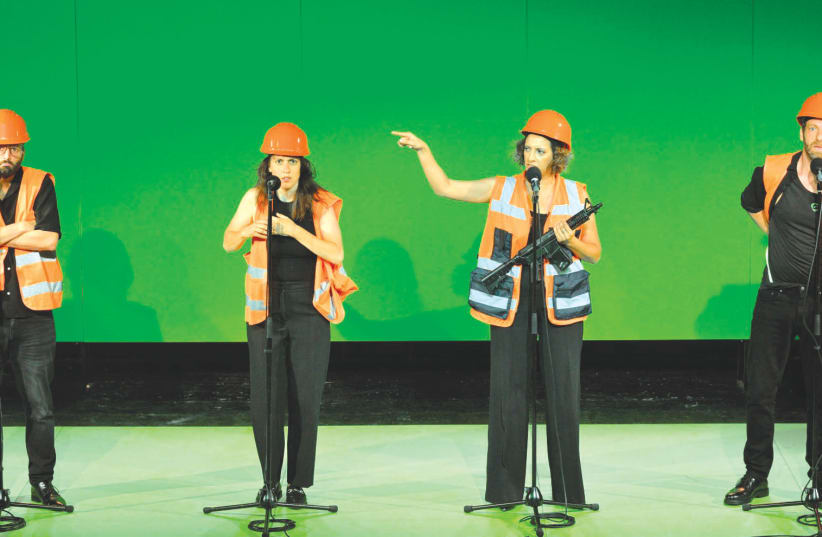Our highly communicative and phone-centric lifestyles take center stage in Maklid/a (Typing), a fresh comedy penned and helmed by Ronnie Brodetzky. Yariv Kook, Eti Vaknin-Sober, Omri Hacohen, Tal Blankstein Peleg, and Ori Uryan embody a diverse array of characters, individuals you either already recognize or may encounter soon as your phone buzzes for attention.
The audience embarks on a whirlwind journey delving into a myriad of scenarios. Kook shines in portraying two immensely humorous characters. Firstly, he embodies a gay individual engaging in text exchanges with a potential romantic interest (Oryan) marred by comically incorrect auto-corrected Hebrew. With just a playful smile and a resistance band, Kook crafts a stark contrast to the articulate Oryan.
His second persona, a fervent protester waving flags, echoes slogans advocating for revolutionary change through unconventional means like standing on one’s head during public demonstrations against the government. As dissent arises, he gradually silences opposing voices within the social media group until he stands alone.
In his 2022 publication “Stolen Focus,” Johann Hari meticulously examines how modern technologies chip away at our focus, heighten mental fatigue, and inundate us with a barrage of messages, notifications, and buzzing gadgets. Hari underscores a pivotal notion that these technologies could have been designed differently; for instance, social media platforms could notify users when a friend is nearby for a spontaneous lunch date instead of endlessly scrolling through content.

Maklid/a aptly captures this dynamic from the get-go. Regardless of our physical location, the act of typing triggers an anticipatory rush for the next dopamine surge. Whether it’s a potential romantic interest or a neighbor, we await their response eagerly, fingers poised over the keyboard.
A Compilation of Diverse Sketches
The show comprises various sketches, ranging from a parents’ group with young children, a family maintaining connections through phone interactions, an actor pursuing overdue payments by messaging producers, to a couple (Hacohen and Blankstein) juggling household chores and childcare amidst a rent hike by their landlord. Additionally, there’s an a cappella rendition of the play’s song “Va’ad Habeit” (building overseer), where actors in drag melodiously narrate the poignant tale of a retiring woman (Vaknin-Sober) who served in the role for eleven years, grappling with the realization that she can’t relinquish her duties.
Similar to Kook’s character, those she tries to sway gradually depart the scene, symbolized by actors gracefully spinning offstage, leaving her isolated and disillusioned. It’s a blend of humor and poignancy.
Audiences may empathize with a character from South America (Hacohen) who questions the necessity of hostility towards a stranger seeking water at a kindergarten (Oryan in a recurring role). Vaknin-Sober’s character, evolving into a more eccentric persona as the narrative unfolds, eventually brandishes a rifle, shifting our perception from amusement to comprehension as her emotional backstory unfolds, shedding light on a tragic loss that could have been prevented with more attentiveness.
To lighten the mood, she playfully nicknames the Spanish-speaking man “Manchego,” after the Spanish cheese, and “Paco,” showcasing her Israeli disregard for his actual name. Her outburst over the loss of her friend, coupled with the declaration that “this is not Switzerland,” underscores deeper emotions. While she may come off as brash and erratic, her vulnerability resonates with the audience.
